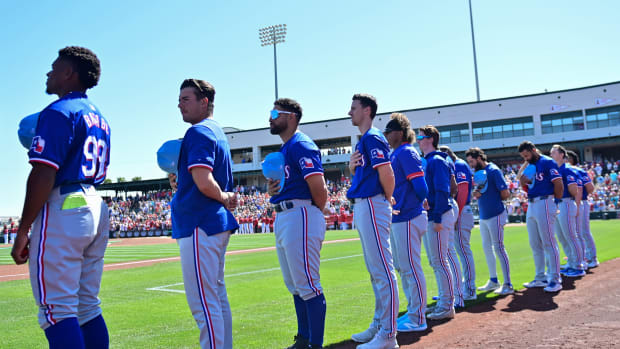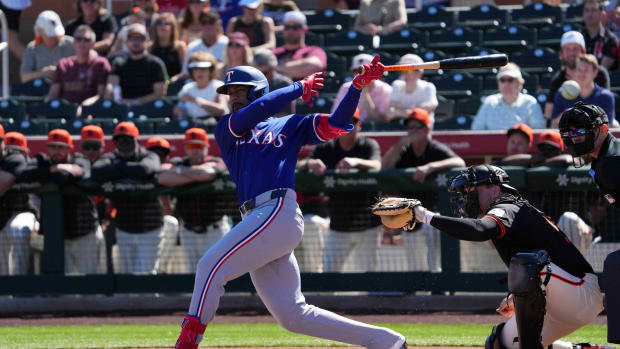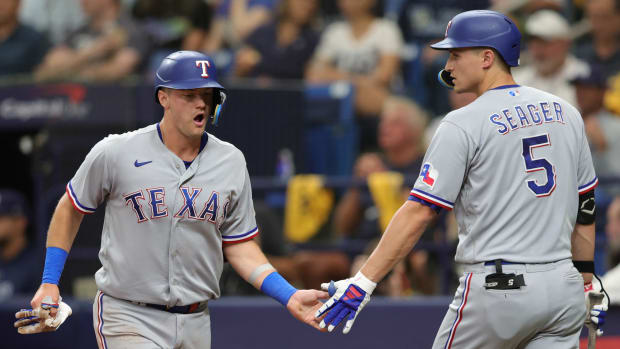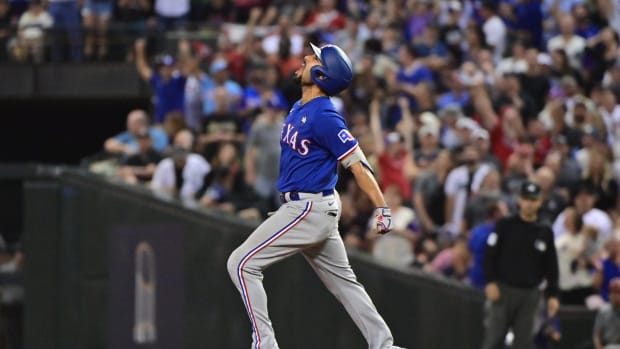The MLB Season Hangs in the Balance Amid Critical Week of Negotiations
The calendar has now rolled over from May to June, the month that could possibly see the first organized baseball activity since mid-March.
However, there is a lot to accomplish—and fast.
It took five days, but the Players Association finally sent an official response to Major League Baseball's initial economic proposal last Tuesday. That response came in the form of a counterproposal (reported by The Athletic), which includes a 114-game season playing June 30 to October 31 with no additional pay cuts taken by the players.
According to MLB Network's Jon Heyman, an ownership source called the proposal a "non starter," which is the same term—coincindentally or deliberately—used by players union chief Tony Clark in description of MLB's initial proposal built on a 50-50 revenue share. The owners seem to be emphatic on the idea that players need to take additional pay cuts in order for there to be a 2020 season.
In case that didn't properly describe the divide between the league and the players, ESPN's Buster Olney reported on Sunday that there is a group of owners that are "perfectly willing" to cancel the season if the players don't come to an agreement that includes further pay cuts.
Last week, Washington Nationals pitcher, union representative, and executive sub-committee member Max Scherzer publicly aired his displeasure with further pay cuts proposed from MLB.
"After discussing the latest developments with the rest of the players there's no reason to engage with MLB in any further compensation reductions. We have previously negotiated a pay cut in the version of prorated salaries, and there's no justification to accept a second pay cut based upon the current information the union has received.
"I'm glad to hear other players voicing the same viewpoint and believe MLB's economic strategy would completely change if all documentation were to become public information."
-Max Scherzer (@Max_Scherzer)
ESPN's Jeff Passan reported on Monday that MLB is discussing a schedule in the ballpark of around 50 games while paying players their full prorated salaries if the two sides cannot come to a return-to-play agreement.
So, progress?
It's difficult to interpret this move as MLB beginning to build the framework of a compromise, but promising full prorated salaries in any form could possibly be the start of something.
Knock on wood.
June 1 was looked at as a soft deadline for the two sides to come to a deal that would allow the 2020 season to commence. Realistically, if the season is to start any time between June 30 and July 4, the two sides likely need to come to an agreement by the end of this week or by early next week at the latest.
To be frank, people need a reason to care about baseball right now. The country is dealing with the fallout of the murder of George Floyd, which has provoked some riots that have escalated to scarring proportions. People can't open their phones or turn on the television without witnessing the tragic and devastating events happening all across the country.
Oh, and do you remember the coronavirus pandemic? You know, that thing that caused the sports world to shut down in the first place? Yeah, that's still going on.
MLB and the players have got to figure things out—for better or for worse. The negotiations so far have lacked an urgency to revive the game amid a pandemic. Instead, they've resembled the back-and-forth of a CBA negotiation.
Ultimately, if either side has to cave to salvage the season, the owners have to be the ones that are proactive. It's their game that will lose its credibility if all other sports can return during a pandemic and baseball can't figure it out because of the almighty dollar.
The National Hockey League already has a return-to-play plan in place that the league and players both agreed upon. To remind you, this is a league that has seen three work stoppages under their current commissioner. If they can figure it out, why can't baseball?
The 1994-95 strike, the last time games were lost due to labor disputes, damaged the game badly. A season lost over money amid a pandemic would be even more damaging. Anything that resembles the 94-95 strike is guaranteed to alienate a large number of fans.
Baseball has an amazing opportunity to showcase their game. They can give millions of Americans the distraction they need from what's been rather forgettable year. A failure to unify and bring the game to their paying customers would be the ultimate swing-and-miss.
This week isn't the time for pride. It's time to set things right. And time is running out.
Follow Inside The Rangers on SI on Twitter: @SITexasRangers
Like Inside The Rangers on SI on Facebook: facebook.com/SITexasRangers
Follow our Rangers insider Chris Halicke on Twitter: @ChrisHalicke
Click the "follow" button in the top right corner to join the conversation on Inside The Rangers on SI. Access and comment on featured stories and start your own conversations and post external links on our community page.




